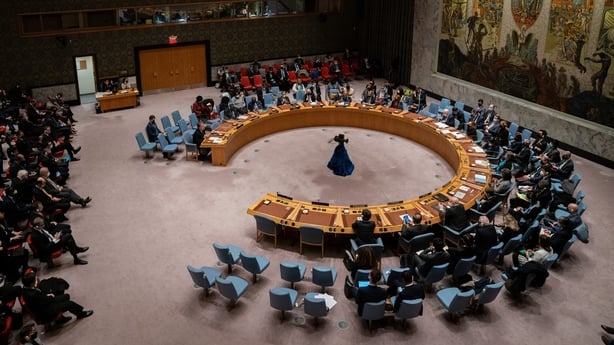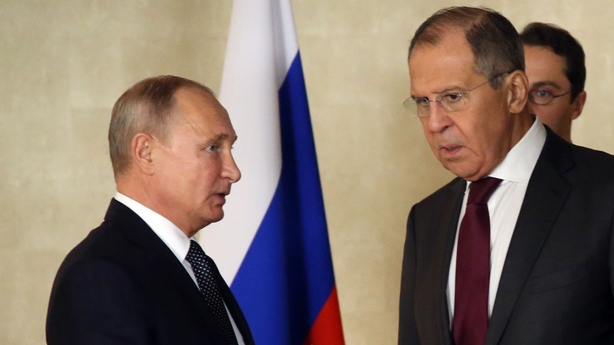The European Commission President has said that Brussels would propose to freeze the assets of the Russian central bank, in a major escalation of sanctions against Moscow following the invasion of Ukraine.
Ursula von der Leyen also said the EU would remove "certain" Russian banks from the SWIFT payment system, in response to a key demand of Kyiv to punish Russian President Vladimir Putin.
These new measures will "cripple Putin's ability to finance his war machine," Ms Von der Leyen said.
She was speaking after a videoconference with the leaders of the United States, Germany, France, Italy and Canada, intended to coordinate the West's response to the invasion.
In coordination with 🇺🇸🇫🇷🇩🇪🇮🇹🇨🇦🇬🇧 I will now propose new measures to EU leaders to strengthen our response to Russia's invasion of Ukraine and cripple Putin’s ability to finance his war machine. https://t.co/iU2waDzo9s
— Ursula von der Leyen (@vonderleyen) February 26, 2022
The allies also agreed to further restrictions on Russian oligarchs, including measures "to limit the sale of citizenship - so-called golden passports - that let wealthy Russians connected to the Russian government become citizens of our countries".
Ms Von der Leyen said she would make the proposals to EU leaders, who could request amendments to minimise the effect of the measures on their economies.
The new wave of sanctions was an extraordinary leap forward in just a few days, that was made possible by a sudden reversal by Germany on its opposition to restricting Russia from SWIFT.
SWIFT's messaging system allows banks to communicate rapidly and securely about transactions, and cutting Russia off would cripple its trade with most of the world.
Italy, Hungary and Cyprus were also opposed to the SWIFT ban, but have come around to the idea in the face of international outrage against Russia's invasion of its neighbour.
In an apparent concession to Berlin, the powers agreed that the ban would only apply to selected banks in order to avoid the measure backfiring too harshly on European businesses.
In probably the most unexpected new measure against Putin, the powers agreed to limit the Russian central bank's ability to access its vast foreign reserves.
These are estimated to be over $600 billion and are the vast windfall of Russia's immense energy wealth.
"This will freeze its transactions. And it will make it impossible for the Central Bank to liquidate its assets," Ms Von der Leyen said.

Meanwhile, the United Nations Security Council is due to vote tomorrow to call for a rare emergency special session of the 193-member UN General Assembly on Russia's invasion of Ukraine, which would be held on Monday, diplomats said.
The vote by the 15-member council is procedural so none of the five permanent council members - Russia, China, France, Britain and the United States - can wield their vetoes. The move needs nine votes in favour and is likely to pass, diplomats said.
Only ten such emergency special sessions of the General Assembly have been convened since 1950.
The request for a session on Ukraine comes after Russia yesterday vetoed a draft UN Security Council resolution that would have deplored Moscow's invasion.
China, India and UAE abstained, while the remaining 11 members voted in favour.
The General Assembly is expected to vote on a similar resolution following several days of statements by countries in the emergency special session, diplomats said. General Assembly resolutions are non-binding but carry political weight.
The United States and allies are seeking as much support as possible to show Russia is internationally isolated.
The UN General Assembly adopted a resolution in March 2014, following Russia's annexation of Ukraine's Crimea region. The resolution, which declared invalid a referendum on the status of Crimea, received 100 yes votes and 11 against. Two dozen countries did not vote and 58 abstained.
UN Secretary-General Antonio Guterres today spoke with Ukraine's President Volodymyr Zelensky, telling him the world body plans to "enhance humanitarian assistance to the people of Ukraine," a UN spokesperson said.
"He informed the President that the United Nations would launch on Tuesday an appeal to fund our humanitarian operations in Ukraine," the UN spokesperson said in a statement.
UN aid chief Martin Griffiths said on Friday that more than $1 billion will be needed for aid operations in Ukraine over the next three months as hundreds of thousands of people are on the move after Russia invaded its neighbour.
Earlier, the United States has said it would impose sanctions on Russian President Vladimir Putin and Foreign Minister Sergei Lavrov, following similar announcements by the European Union and the UK.

White House press secretary Jen Psaki said that a travel ban would be part of the sanctions.
Following the spate of measures, Russian foreign ministry spokeswoman Maria Zakharova said on Russian television that "we have reached the line after which the point of no return begins."
The United States' new measures come in addition to those it already announced, including a tranche of sanctions that will hit four Russian banks, cut off more than half of Russia's technology imports, and target several of the country's oligarchs.
Ms Psaki additionally announced on Twitter that sanctions would be imposed on the Russian Direct Investment Fund, the country's sovereign wealth fund.

